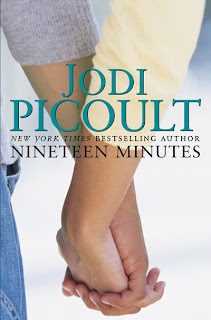
The book’s first chapter tells the story of the day of the shooting that leaves ten people dead and nineteen wounded. Shooter, Peter Houghton is not the sort of teen one would normally associate with a violent crime. He’s quiet, intelligent, sensitive, shy and introverted, the only son of two very successful parents—Lewis, a college professor and Laci, a midwife.
The first chapter establishes the shooter’s identity beyond a doubt, and the rest of the novel goes back and forth in time to pivotal, influential incidents that lead to the shooting. I have to hand it to Picoult. She never loses control of the narrative—in spite of the fact that the details are revealed by increments through crucial events. The author presents a refreshing premise: a high school shooting is instigated by far more complicated forces than the lyrics of some rock band.
Nineteen Minutes is one of those topical novels, and unfortunately high school shootings certainly hit the headlines far more than we wish. All of the shootings raise some terrible questions: how did this happen? Were there warning signs? How did the shooter access weaponry? Where were the parents of the shooter or shooters during all of this? In dissecting the shooting and examining the events that lead up to the fateful day, Nineteen Minutes paints Houghton as a victimized youth, so bullied and tormented by high school jocks, that in a fractured mental state, he returns to school armed to the teeth.
Picoult examines every angle of the story—the defense attorney, the police detective, the parents of the shooter, the aftermath in the town, etc. Every possible angle is examined, and for the most part the shallow characters are entirely unbelievable. For example, there’s judge Alex Cormier who’s such a bimbo that she imagines she can try the case against Houghton in spite of the fact that her 17-year-old daughter was at the scene and injured during the shooting. Before we can say "Conflict of Interest" we are supposed to swallow Alex’s chest beating dilemma—should she try the case or step down? If the trial is good for her career, is it good for her daughter? These sorts of navel-gazing dilemmas are rife throughout the novel. In another example, the police detective (another unbelievable character) gets the hots for Judge Cormier. So there’s more agony … should he date her? What if people find out? Will a romantic relationship with the judge impact the detective, blah, blah, blah. In trying to answer all of the questions left in the aftermath of the shooting, Nineteen Minutes is an ambitious novel, but the novel’s weepie, overly sensitive style is grating. Stuffed full of sappy, trite lines, the novel hits every cliché. Here’s Alex Cormier in the hospital at her daughter’s bedside:
“We will go to the rain forest, or the pyramids, or a beach as white as bone. We will eat grapes from the vine, we will swim with sea turtles. We will walk miles on cobblestone streets. We will laugh, talk and confess. We will.”
It’s no doubt valuable and certainly fascinating to examine what makes someone snap into violence, and perhaps a different type of novel could examine the situation in a credible way, but Nineteen Minutes, emphasizing the emotional fallout of the shooting, is too superficial and shallow to even begin to delve deeply into such a complicated situation. If the reviews on Amazon are any indicator, then I certainly have the minority opinion here. As of today, Amazon boasts 395 reviews—230 of which are glowing 5-star homages; 98 are 4-star reviews, 43 are 3-star reviews, while at the bottom of the barrel are 15-2 star reviews and 9-1 star reviews. Oh well.
I realize the novel is fiction, full of fictional characters that don’t exist, and I actually have no problem whatsoever with the idea that everything here is fiction. To me, most of the fictional characters are very superficially drawn, very one-dimensional and unbelievable. But given the notoriety of real-life high school shootings, I found it impossible not to recall the horror of Columbine, and draw some similarities. I consider it most unfortunate that the novel seems determined to paint Peter as a victim—from his first day of kindergarten when someone grabs his Superman lunchbox. While it’s true that he is the recipient of horrible bullying, the author goes to great lengths to make her point by painting some of the victims as monstrous. Matt Royston, for example, one of the high school jocks in the book is obnoxious enough without adding the other dimensions that slip in as the chapters mount. Personally, I think it’s a cheap shot to paint the victims as somehow "asking for it." It’s certainly valid to analyze what pushes some people over the brink, but Nineteen Minutes goes overboard in its portrayals and its agenda to discuss peer bullying. In spite of the fact this was fiction, the novel left a bad taste in my mouth.
Finally, the novel’s resolution felt forced. This was the first time that, on reaching the end, it felt like Picoult had painted herself into a corner regarding resolution. Even though there are very few happy resolutions to her other novels, there always seemed to be a note of hope for the futures of her characters, but the attempt here was hollow, predictable. It’s perfectly okay for a novel to end on a pessimistic note, as long as it is sincere, as long as it rings true to the characters and the story. Though most of the novel was compelling, its tendency to tread water with the unnecessary and the overcomplicated caused it to drag more than it should.
No comments:
Post a Comment